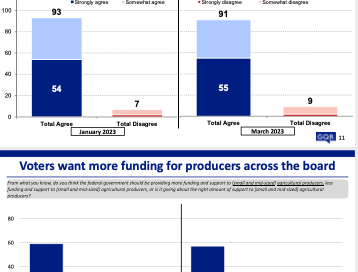Putting Industrial Agriculture in its Place is Good Politics.
Smart electoral math—coupled with funding organizing against agribusiness by farmers and rural people—could transform Farm State politics. A Cocklebur analysis.
Farmers are greatly revered by most voters. That overwhelming support was documented earlier this year by the Johns Hopkins Center for a Livable Future’s (CLF) 2023 National Farm Bill Poll results.
During elections and policy debates, farmers are seen as trusted messengers and are a coveted political group. Elected officials in both parties tend to search out farm allies, usually finding them in the Farm Bureau or the checkoff-funded commodity groups.
But as The Cocklebur has touched on before, these lobbying organizations (such as the Farm Bureau, National Cattlemen’s Beef Association, National Pork Producers Council, and so on) are highly controversial in farming communities. Their agenda of environmental de-regulation, tax cuts for the rich, and blocking climate action is not popular. But these groups do punch above their weight and have vast political power and influence in Washington, DC and in state capitals across the United States.
Industrial Agriculture is an imperfect term, but it is the word I use for the consortium of groups, lobbyists, politicians, consultants, think tanks, corporations, and the ag press who work collectively to defend giant industrial livestock factories and vast monocultures of row crops. I am open to suggestions for better language, though a different defining term must resonate with the family farm opposition to corporate power.
At its core, the “Farm Vote” is a misunderstood interest group that muddies the water of rural politics. Many political pundits, consultants, and mainstream media personalities tend to base their perceptions of rural voters on false stereotypes and political rhetoric rather than data (see my analysis in Barn Raiser’s “Rural America Isn’t What You Think”). Most critical to this point is understanding the actual number of voters that make their living from farming in today’s food system.
In fact, when it comes to those who make up the Industrial Agriculture lobby, we’re talking about an incredibly small slice of the electorate. There are only slightly more than 219,000 farms in the whole country that are classified as medium, large, or “nonfamily” farms, according to the U.S. Department of Agriculture’s Economic Research Service (ERS).
These farms own the vast majority of land and generate the vast majority of sales and profits, which translates to a concentration of production. Such concentration is most prevalent in hogs, grain, soybeans, cotton, dairy, and specialty crops (USDA’s term for vegetables, fruit, and nuts).
The question becomes, just how much political power should we give to such a small constituency—especially one pushing for policies that only support the largest and richest farmers? Not much, if you ask the farmers and rural people organizing against Industrial Agriculture in many parts of Rural America.
In the heart of the Corn Belt, farmers and rural residents have been leading the fight against Industrial Agriculture for the last 30 years. Members of organizations such as Iowa Citizens for Community Improvement, Missouri Rural Crisis Center, and Land Stewardship Project (MN) point the way to politics that embraces farmers but rejects Industrial Agriculture. (FULL DISCLOSURE—The Cocklebur’s Bryce Oates currently provides occasional paid communications support to Iowa CCI, and also worked for MRCC in the early 2000s).
This type of nuance and distinction between family farmers and Industrial Agriculture is recognized by voters more broadly. That same Johns Hopkins Farm Bill poll found that support for corporate agribusiness is lacking.
Additionally, a majority of voters support policies that Industrial Agriculture opposes, such as a national moratorium on industrial livestock factories (CAFOs—concentrated animal feeding operations).
In closing, let us remember that the number of Industrial Agriculture votes is incredibly small, a speck of dust on the electoral map. As such, progressive campaigners, candidates, and donors have virtually nothing to lose by supporting the widespread, popular fight against Industrial Agriculture and partnering with ready-made organizations that can go to work quickly. Unfortunately, many Democrats continue to think that the best way to win in Farm Country is to kiss the Industrial Agriculture ring.
The Cocklebur covers rural policy and politics from a progressive point-of-view. Our work focuses on a tangled rural political reality of dishonest debate, economic and racial disparities, corporate power over our democracy, and disinformation peddled by conservative media outlets. We aim to use facts, data, and science to inform our point-of-view. We wear our complicated love/WTF relationship with rural America on our sleeve.









